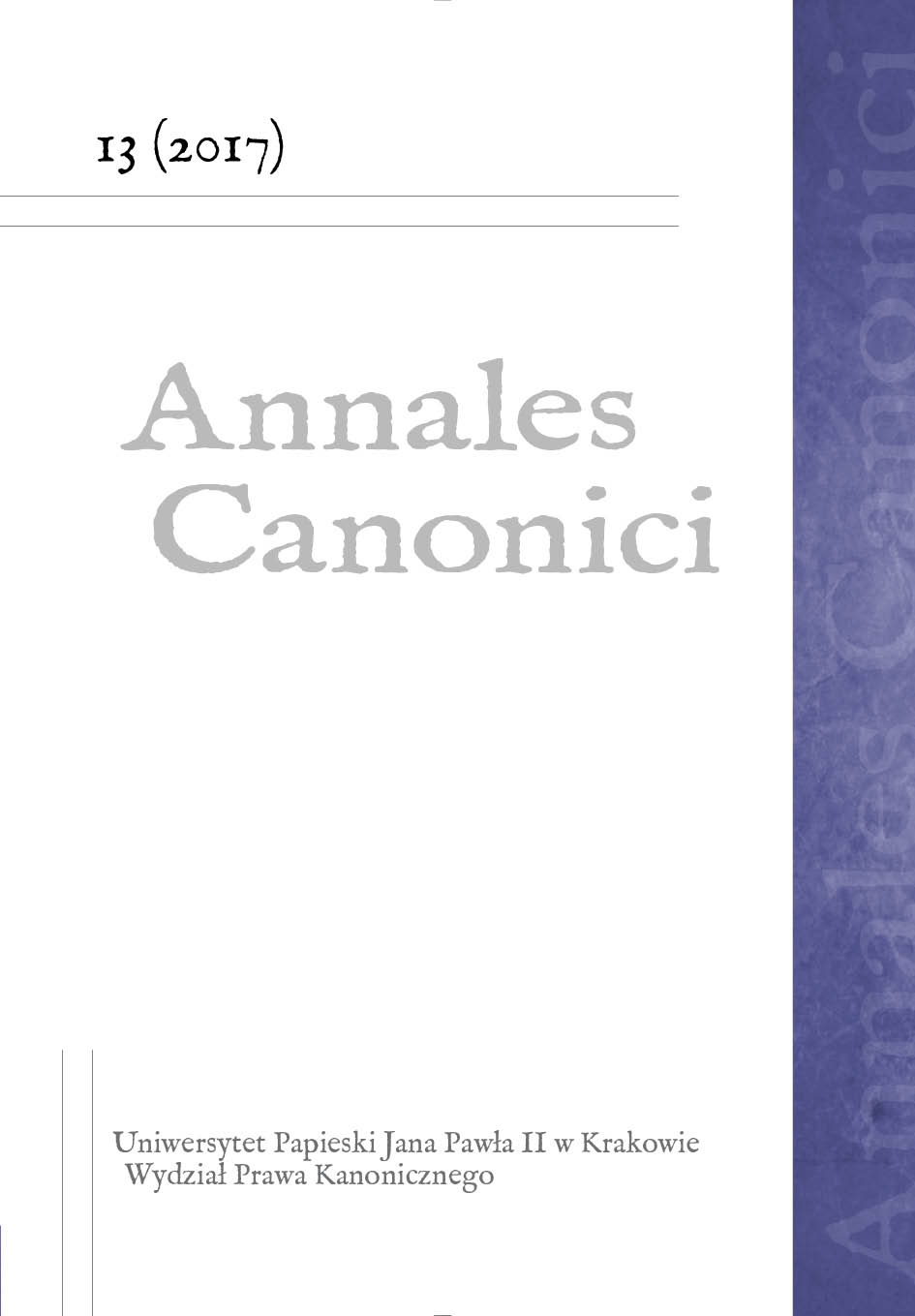I precetti ecclesiali – la pastorale e il diritto tra universale e particolare
DOI:
https://doi.org/10.15633/acan.2218Słowa kluczowe:
precetti della Chiesa, i diritti e gli obblighi dei fedeli, il diritto particolare, il Catechismo della Chiesa CattolicaAbstrakt
L’articolo espone lo sviluppo di una parte importante del diritto canonico e dell’insegnamento cattolico nella Chiesa universale e in quella presente in Polonia.Nella prima parte viene descritta la storia delle formule catechistiche riguardanti i principali obblighi del fedele dal tempo del Concilio di Trento fino alla metà del ventesimo secolo, prendendo in considerazione la prospettiva della Chiesa cattolica in Polonia. Le indicazioni fondamentali – l’obbligo di festeggiare la domenica, il precetto della confessione e della comunione pasquale, le esigenze circa il digiuno – sono presenti in tutto il mondo cattolico, anche se le specifiche condizioni del tempo e del luogo hanno influenzato la loro forma concreta.
Nella seconda parte è dibattuto il problema dei precetti ecclesiali nel Catechismo della Chiesa Cattolica. Questo documento fondamentale fu pubblicato per la prima volta in lingua francese nel 1992. Dopo molte correzioni, nel 1997 è stata presentata l’editio tipica in lingua latina. Infine nel 2005 papa Benedetto XVI ha ordinato la pubblicazione del Compedio del Catechismo della Chiesa Cattolica. Nell’articolo vengono analizzate le formule dei precetti ecclesiali in tutte e tre le versioni del catechismo. Va notato che, malgrado 500 anni di storia della propagazione dei precetti della Chiesa, solo adesso sono stati formulati come vincolanti in tutta la Chiesa universale.
La terza parte verte sulla versione polacca dei precetti della Chiesa, promulgata dalla Conferenza Episcopale Polacca nel 2003 e riformata nel 2014. I vescovi polacchi hanno approfittato della possibilità di accomodare il testo dei precetti agli specifici bisogni e aspettative delle Chiese particolari. Con il consenso della Sede Apostolica, i pastori della Chiesa cattolica in Polonia hanno esonerato i fedeli dall’obbligo di festeggiare alcuni giorni festivi, ma nello stesso tempo hanno confermato la proibizione di partecipare ai divertimenti durante la Quaresima, ampliandola anche a tutti i venerdì dell’anno. Nel 2014 fu introdotto l’ultimo cambiamento nel testo dei precetti, con la decisione di lasciare la proibizione dei divertimenti solamente nel tempo di Quaresima.
In conformità con il suo titolo, l’articolo espone il profondo legame tra il diritto e la pastorale, ma anche la relazione tra il diritto universale e il suo adattamento nel diritto particolare.
Bibliografia
Bączkowicz F., Prawo kanoniczne. Podręcznik dla duchowieństwa, t. 2, Kraków 19583.
Bellarminus R., Dichiarazione più copiosa della Dottrina Cristiana composta in forma di dialogo, cap. VII, in: R. Bellarminus, Opera Omnia, vol. 4, Neapoli 1862.
Canisius P., Catechismus maior seu Summae doctrinae christianae ante Tridentina, in: S. Petri Canisii Catechismi Latini et Germanici. Pars prima: Catechismi Latini, ed. F. Streicher, Romae–Monachii 1933.
Catéchisme de l’Église Catholique, Rome 1992.
Catechismo della Chiesa Cattolica, Vaticano 1999.
Ciołek D., Zrozumieć przykazania kościelne, in: T. Bartoś et al., Pięć słów Kościoła, Warszawa 2005, p. 5–18.
Codex Iuris Canonici auctoritate Ioannis Pauli PP. II promulgatus, Romae 1983.
Commento teologico al Catechismo della Chiesa Cattolica, a cura di R. Fisichella, Piemme Casale Monferrato 1993.
Compendio del Catechismo della Chiesa Cattolica, Vaticano 2005.
Concilium Oecumenicum Decreta, a cura di G. Alberigo, G. L. Rossetti et al., Bologna 1996.
Congregazione per la Dottrina della Fede, lettera del 22 maggio 2002, «Anamnesis» 8 (2002) nr 31, p. 39, http://www.kkbids.episkopat.pl/uploaded/a31/Anamnesis31–2dPrzykazania%20ko%C5%9Bcielne.pdf (31.12.2016).
Dohnalik J., Il precetto pasquale. La normativa sulla Comunione e la confessione annuale (cann. 920 e 989) alla luce della tradizione canonica, Roma 2015.
Dublanchy E., Commandements de l’Église, in: Dictionnaire de thèologie catholique, sous la direction de A. Vacant, E. Mangenot, t. 3/1, Paris 1911, p. 388–392.
Encyklopedia Kościelna, red. M. Nowodworski, vol. 22, Warszawa 1898.
Francesco, Evangelii gaudium,Vaticano 2013.
Giovanni Paolo II, cost. ap. Fidei depositum, 11.10.1992, in: Catechismo della Chiesa Cattolica, Vaticano 1999 p. 17–29.
Góralski W., Władza ustawodawcza Konferencji Episkopatu według Kodeksu Prawa Kanonicznego z 1983, «Prawo Kanoniczne» 32 (1989) 1–2, p. 45–57.
Konferencja Episkopatu Polski, Nowe sformułowania przykazań kościelnych i wykładnia dla przykazań I i IV”, «Akta Konferencji Episkopatu Polski» 2003 nr 8, p. 33, http://www.kkbids.episkopat.pl/uploaded/a%2034/Anamnesis34–2bKongrNauki%20Wiary.pdf (31.12.2016).
Konferencja Episkopatu Polski, Uchwała nr 15/364/2014, http://www.katecheza.episkopat.pl/index.php/menu/listy-pasterskie-episkopatu/87-nowe-brzmienie-pieciu-przykazan-koscielnych (31.12.2016).
Kongregacja ds. Kultu Bożego i Dyscypliny Sakramentów, Dekret dotyczący świąt zniesionych w Polsce, 4.03.2003, «Akta Konferencji Episkopatu Polski» 2003 nr 8, p. 32, http://www.kkbids.episkopat.pl/uploaded/a%2034/Anamnesis34–2aNotyfLG.pdf (31.12.2016).
Mosca V., Per un diritto particolare missionario secondo la legislazione universale della Chiesa, «Euntes Docete» 54 (2001) 3, p. 73–92.
Pio X, Il Catechismo Maggiore. Nel centenario della sua pubblicazione, Padova 2005.
Villien A., Histoire des commandements de l’Église, Paris 1909.
Wróbel J., Przykazania kościelne wczoraj i dziś, in: Przykazania kościelne dzisiaj, red. J. Nagórny, J. Gocko, Lublin 2001, p. 77–99.
Pobrania
Opublikowane
Numer
Dział
Licencja
Prawa autorskie (c) 2017 Jan Dohnalik

Utwór dostępny jest na licencji Creative Commons Uznanie autorstwa 4.0 Międzynarodowe.
Autorzy publikujący w czasopiśmie udzielają jego wydawcy zgody o następującej treści:
- Autor zachowuje autorskie prawa majątkowe do utworu, a jednocześnie udziela wydawcy czasopisma zgody na jego pierwszą publikację w wersji drukowanej i wersji online na licencji Creative Commons Uznanie autorstwa 4.0 Międzynarodowe oraz zgody na wykonywanie opracowań, w tym przekładów.
- Autor ma możliwość udzielania zgody niewyłącznej na opublikowanie utworu w wersji, która ukazała się w czasopiśmie (np. zamieszczenia go w repozytorium instytucjonalnym lub opublikowania w książce), wraz z informacją o jego pierwszej publikacji w czasopiśmie.
- Autor może umieścić swój utwór online (np. w repozytorium instytucjonalnym lub na swojej stronie internetowej) jeszcze przed zgłoszeniem utworu do czasopisma.

